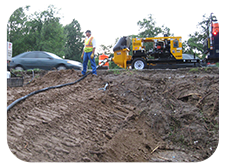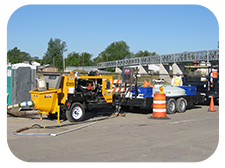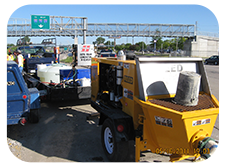Trailer Mounted Concrete Pumping
Improve construction times, see quicker return on investment and
tackle more aggressive residential and commercial engineering projects.
  
| The Problem: Worldwide deteriorating infrastructure |
On an international scale, sewers, roads and
other underground supports are in need of
repair. After decades of use and increased
wear due to population booms, repairs are
mandatory to maintain necessary safety
standards, lengthen the life of existing
infrastructure, and reduce further damage.
 |
Slope Stabilization
- Greatly reduces the risk of landslides
due to changes in water amounts
- Protects existing infrastructure from
damage
|
 |
Fill Abandoned Pipe & Mine Shafts
- Prevent odors and ground instability
due to pipe deterioration
- Eliminate accidental death and injury
due to mine cave-ins
|
 |
Pressure Grouting
- Improves geomaterials (soil & rock)
- Strengthens or reduce water flow
through a formation
- Corrects faults in concrete and masonry
structures
- Strengthens the foundation to support
the weight of the overlying structure
|
The Strategic Advantages of
Trailer Mounted Concrete Pump...
Managers and supervisors like trailer
mounted concrete pump technology
because it has several distinct advantages
over other concrete laying methods:
- It allows for improved construction
times, reduced cost, and more
aggressive engineering projects.
- It offers quicker return on investment
for companies and individuals hiring
the concrete work, as efficiency is
greatly improved.
- Its compact size provides better
mobility around job sites.
- Its lower output rates are ideal for
commercial AND residential projects.
- Its unintrusive presence allows other
construction projects to continue
simultaneously.
Pressure Grouting is a
process that injects a grout
under the ground and into
loose soils to solidify and
strengthen the foundation
soils. The mixture can be
injected as deep as 80
feet or more underground.
This process can be used
to stabilize soil or in some
cases, lift structures that
have settled.
The Tactical Advantages of
Trailer Mounted Concrete Pump...
Engineers and contractors like trailer
mounted concrete pump technology
because:
- It has the ability to handle a wide
variety of pumping applications such
as commercial slabs and decks,
shotcrete, even vertical concrete
pumping for multi-story
buildings.
- It can pump the harshest pea gravel
mixes all the way up to 1” (25mm)
hard rock concrete.
- With its compact size and hundreds
of feet of hose, it’s easy to gain
access to tight or difficult work sites.
- It takes away some of the physical
labor involved in transporting large
volumes of concrete.
An 82hp Perkins diesel engine allows the
concrete to be pumped vertically and keeps
pressure strong at long hose lengths
THE TRAILER MOUNTED
CONCRETE PUMP
How Do They Work?
The concrete pump generally consists
of a receiving hopper, two concrete
pumping cylinders, and a valve
system controlling the flow of the
concrete from the hopper to the
pipeline. Pre-mixed concrete which
can be prepared on-site or hauled
from mixing stations is loaded into
the hopper. One cylinder receives
from the hopper while the other
dispenses to the pipe. The pipeline is
made up of both steel lengths of pipe
and heavy duty flexible hose. Long
lengths of hose can be used to reach
the point of placement without losing
pump pressure.
With the development of construction
technology, new machinery, methods,
and techniques, what once were
difficult tasks have now become
easier, more efficient and more
precise. While concrete pumping can
be used in all construction sites, it is
especially useful in projects where
space for equipment is limited and the
terrain is rather complicated.
|
| |
|
|